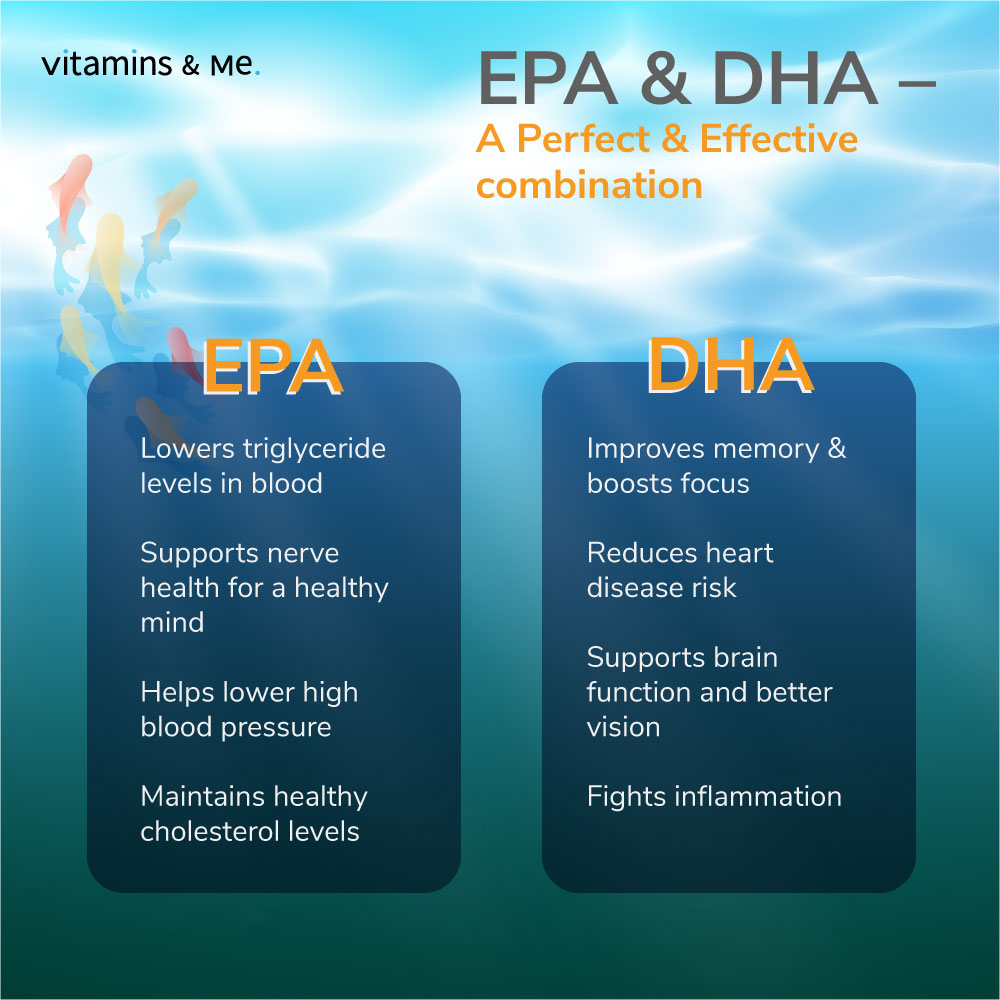OMEGA 3 BURPLESS FISH OIL 1000 MG with 180 MG EPA & 120 MG DHA 40 Softgels

- Burpless Fish Oil: Our omega-3 capsules provide the benefits without any unpleasant burps or fishy aftertaste.
- Proprietary formula: We have developed a proprietary encapsulation technology (SmartGels Delivery Systems) that eliminates burps for a superior user experience.
- Fresh & potent: We use only the freshest, purest, most potent omega-3 ingredients for effective results with every capsule.
- Pharmacist formulated: Developed by nutrition pharmacists using the latest science and technology.
- Supports Heart Health
- Promote Brain Health
- Boosts Joint Health
Net Qty: 40 Softgels
MRP ₹: 699, USP ₹ Per Soft Gelatin Capsule: 17.47
Country of Origin: INDIA
Out of stock
Offers
₹699.00 ₹299.00
Out of stock
Category Letter Vitamins






FSSAI APPROVED

USFDA REGISTERED

GMP CERTIFIED

ISO CERTIFIED

MAKE IN INDIA
Active Ingredients

Eicosapentaenoic acid (EPA)
180 mg Eicosapentaenoic acid (EPA)

Docosahexaenoic acid (DHA)
120 mg Docosahexaenoic acid (DHA)
SCIENTIFIC EVIDENCE
Omega 3 Fatty Acids
Omega 3 Deficiency: A Silent Health Crisis
Omega 3 Fatty Acids
The major types of omega 3 fatty acids are alpha-linolenic acid (ALA), eicosapentaenoic acid (EPA), and docosahexaenoic acid (DHA). There is mounting scientific evidence showing the important health benefits of consuming omega 3 fatty acids.
Omega 3 Deficiency: A Silent Health Crisis
Omega 3 fatty acids are anti-inflammatory and help reduce the risk of chronic diseases such as heart disease, cancer and arthritis (Simopoulos AP, 2008). Multiple studies show that consumption of fish or fish oil supplements rich in EPA and DHA reduces the risk of cardiovascular disease and heart attack (Mozaffarian D and Wu JH, 2011). Omega 3 fatty acids also improve risk factors for heart disease such as reducing blood pressure, heart rate, triglycerides and plaque build-up in arteries (Saravanan P, 2010). Omega 3 fatty acids, especially DHA, are essential for proper brain and eye development in babies. DHA deficiency can impair visual and neurological development in infants (Innis SM, 2012). Omega 3 fatty acids may help ameliorate psychiatric disorders such as depression, schizophrenia, Alzheimer’s disease and dementia (Grosso G et al., 2014). There is increasing evidence that omega 3 fatty acids inhibit the development and progression of certain cancers such as colon, breast and prostate cancer (Gerber M, 2012). Omega 3 fatty acids also help in rheumatoid arthritis by reducing inflammation and morning stiffness (Calder PC, 2014). In summary, omega 3 fatty acids have significant health benefits especially in improving cardiovascular health, neurological development, and reducing the risk of cancer and arthritis. Increased consumption of fish or fish oil supplements can help people gain these remarkable benefits.
References:
1. Simopoulos AP. The importance of the omega-6/omega-3 fatty acid ratio in cardiovascular disease and other chronic diseases. Exp Biol Med (Maywood). 2008 Jun;233(6):674-88. doi: 10.3181/0711-MR-311. PMID: 18408140. https://pubmed.ncbi.nlm.nih.gov/18408140/
2. Mozaffarian D, Wu JH. Omega-3 fatty acids and cardiovascular disease: effects on risk factors, molecular pathways, and clinical events. J Am Coll Cardiol. 2011 Nov 8;58(20):2047-67. doi: 10.1016/j.jacc.2011.06.063. PMID: 22051327. https://pubmed.ncbi.nlm.nih.gov/22051327/
3. Saravanan P, Davidson NC, Schmidt EB, Calder PC. Cardiovascular effects of marine omega-3 fatty acids. Lancet. 2010 Aug 14;376(9740):540-50. doi: 10.1016/S0140-6736(10)60445-X. PMID: 20638121. https://pubmed.ncbi.nlm.nih.gov/20638121/
4. Innis SM. Dietary omega 3 fatty acids and the developing brain. Brain Res. 2008 Oct 27;1237:35-43. doi: 10.1016/j.brainres.2008.08.078. Epub 2008 Aug 27. PMID: 18778384. https://pubmed.ncbi.nlm.nih.gov/18778384/
5. Grosso G, Pajak A, Marventano S, Castellano S, Galvano F, Bucolo C, Drago F, Caraci F. Role of omega-3 fatty acids in the treatment of depressive disorders: a comprehensive meta-analysis of randomized clinical trials. PLoS One. 2014 May 7;9(5):e96905. doi: 10.1371/journal.pone.0096905. PMID: 24805797; PMCID: PMC4013105. https://pubmed.ncbi.nlm.nih.gov/24805797/
6. Gerber M. Omega-3 fatty acids and cancers: a systematic update review of epidemiological studies. Br J Nutr. 2012 Oct;108 Suppl 2:S228-39. doi: 10.1017/S0007114512001684. PMID: 23107533. https://pubmed.ncbi.nlm.nih.gov/23107533/
7. Calder PC. Omega-3 fatty acids and inflammatory processes: from molecules to man. Biochem Soc Trans. 2014 Oct;42(5):1058-65. doi: 10.1042/BST20140174. PMID: 25168869. https://pubmed.ncbi.nlm.nih.gov/25168869/
References:
1. Simopoulos AP. The importance of the omega-6/omega-3 fatty acid ratio in cardiovascular disease and other chronic diseases. Exp Biol Med (Maywood). 2008 Jun;233(6):674-88. doi: 10.3181/0711-MR-311. PMID: 18408140. https://pubmed.ncbi.nlm.nih.gov/18408140/
2. Mozaffarian D, Wu JH. Omega-3 fatty acids and cardiovascular disease: effects on risk factors, molecular pathways, and clinical events. J Am Coll Cardiol. 2011 Nov 8;58(20):2047-67. doi: 10.1016/j.jacc.2011.06.063. PMID: 22051327. https://pubmed.ncbi.nlm.nih.gov/22051327/
3. Saravanan P, Davidson NC, Schmidt EB, Calder PC. Cardiovascular effects of marine omega-3 fatty acids. Lancet. 2010 Aug 14;376(9740):540-50. doi: 10.1016/S0140-6736(10)60445-X. PMID: 20638121. https://pubmed.ncbi.nlm.nih.gov/20638121/
4. Innis SM. Dietary omega 3 fatty acids and the developing brain. Brain Res. 2008 Oct 27;1237:35-43. doi: 10.1016/j.brainres.2008.08.078. Epub 2008 Aug 27. PMID: 18778384. https://pubmed.ncbi.nlm.nih.gov/18778384/
5. Grosso G, Pajak A, Marventano S, Castellano S, Galvano F, Bucolo C, Drago F, Caraci F. Role of omega-3 fatty acids in the treatment of depressive disorders: a comprehensive meta-analysis of randomized clinical trials. PLoS One. 2014 May 7;9(5):e96905. doi: 10.1371/journal.pone.0096905. PMID: 24805797; PMCID: PMC4013105. https://pubmed.ncbi.nlm.nih.gov/24805797/
6. Gerber M. Omega-3 fatty acids and cancers: a systematic update review of epidemiological studies. Br J Nutr. 2012 Oct;108 Suppl 2:S228-39. doi: 10.1017/S0007114512001684. PMID: 23107533. https://pubmed.ncbi.nlm.nih.gov/23107533/
7. Calder PC. Omega-3 fatty acids and inflammatory processes: from molecules to man. Biochem Soc Trans. 2014 Oct;42(5):1058-65. doi: 10.1042/BST20140174. PMID: 25168869. https://pubmed.ncbi.nlm.nih.gov/25168869/

NON-GMO

GLUTEN FREE

HALAL

NO EGG

DAIRY FREE
Important to know
• Increased inflammation in the body which leads to various diseases.
• Higher risk of heart disease, heart attacks and high blood pressure.
• Memory decline, mood disorders and cognitive impairment.
• Poor eye health and vision.
• Weaker immunity and frequent infections.
• Joint and bone problems like arthritis and osteoporosis.
• Fatigue, low energy and tiredness.
• Higher risk of heart disease, heart attacks and high blood pressure.
• Memory decline, mood disorders and cognitive impairment.
• Poor eye health and vision.
• Weaker immunity and frequent infections.
• Joint and bone problems like arthritis and osteoporosis.
• Fatigue, low energy and tiredness.
For adults: Take One soft gelatin capsule in a day or as recommended by Healthcare professional

Trusted by over 10000+ Clients worldwide since 2020
4.6
4.6/5
Formulated by Pharmacists
Related products
-
Sale!
 Out of stock
Letter Vitamins
Out of stock
Letter VitaminsCALCIUM with MAGNEISUM, ZINC, VITAMIN D3 & CISSUS QUADRANGULARIS, 60 Tablets
₹599.00₹149.00 -
Sale!
 Out of stock
Out of stock
-
Sale!
 Out of stock
Out of stock








